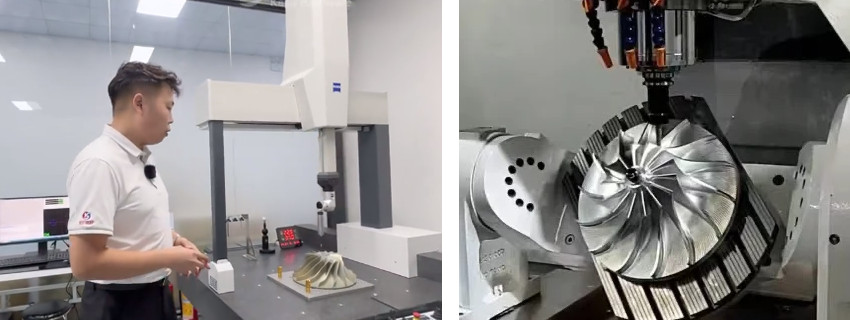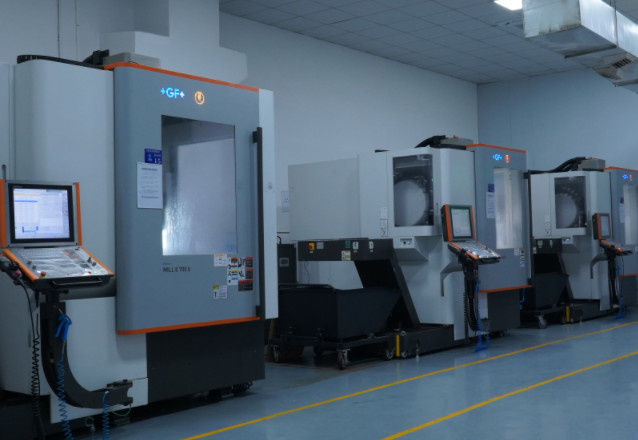Selecting the right CNC machining service provider is critical for ensuring on-time delivery, high-quality parts, and cost-effective production. Computer Numerical Control (CNC) machining involves precise, automated processes that transform raw materials into finished components using pre-programmed software. The ability of a service provider to meet delivery timelines while maintaining quality depends on multiple factors, including their technical capabilities, operational efficiency, and reliability. This guide provides a detailed, systematic approach to evaluating CNC machining service providers, emphasizing practical and technical considerations to ensure timely delivery. The following sections outline key factors, supported by specific parameters and actionable insights.
Assess Technical Capabilities and Equipment
The technical capabilities of a CNC machining service provider directly impact their ability to deliver parts on time. Modern CNC machining requires advanced equipment, such as 3-axis, 4-axis, or 5-axis milling machines, CNC lathes, and routers, to handle diverse geometries and materials. Providers must have the right machinery to meet your project’s specifications without delays caused by equipment limitations.
Evaluate the provider’s machine inventory. For example, 5-axis CNC machines can produce complex geometries with tolerances as tight as ±0.01 mm, reducing setup times compared to 3-axis machines, which are better suited for simpler parts. Confirm whether the provider has multi-axis machines if your project involves intricate designs, as these reduce production time by minimizing repositioning. Additionally, check if they use closed-loop control systems, which monitor axis movement with encoders to ensure precision and repeatability, critical for avoiding rework that could delay delivery.
Material compatibility is another key factor. The provider should have experience machining your required materials, such as aluminum, stainless steel, titanium, or plastics like ABS or PEEK. For instance, titanium requires slower cutting speeds (e.g., 30–50 m/min) due to its hardness, which can affect lead times. Ensure the provider can source materials promptly to avoid delays. Ask for details on their equipment maintenance schedules, as poorly maintained machines can cause unexpected downtime, impacting delivery timelines.
Verify Quality Control and Certifications
Quality control is essential to prevent defects that lead to rework and delivery delays. A reliable CNC service provider implements robust quality assurance processes throughout production. Look for certifications such as ISO 9001:2015, which ensures consistent quality management, or industry-specific standards like AS9100D for aerospace or IATF 16949:2016 for automotive applications. These certifications indicate a commitment to standardized processes that minimize errors.
Inspect the provider’s quality control measures. They should use advanced inspection tools, such as coordinate measuring machines (CMM) with accuracy up to ±0.001 mm, two-dimensional measuring tools, or XRF analyzers for material verification. Ask about their inspection frequency—whether they conduct in-process checks or only final inspections. In-process inspections can catch errors early, reducing the risk of delays due to defective parts. For example, a provider might use statistical process control (SPC) to monitor tolerances during production, ensuring parts meet specifications without requiring time-consuming corrections.
Request data on their defect rates or return rates. A provider with a return rate below 0.2% annually demonstrates strong quality control. Additionally, inquire about their design-for-manufacturability (DFM) feedback process. Providers that offer DFM analysis can identify potential issues in your CAD designs, such as undercuts or tight tolerances, before production begins, preventing delays caused by design revisions.
Evaluate Production Capacity and Scalability
A provider’s production capacity determines their ability to handle your order volume and meet deadlines. Assess their infrastructure, including the number of CNC machines and their operational uptime. For example, a facility with over 200 CNC machines can handle high-volume orders (e.g., 10,000+ parts per month) more effectively than a smaller shop with limited equipment. Ask about their current workload and whether they can prioritize rush orders if needed.
Scalability is crucial for long-term partnerships. A provider should be able to scale production from prototypes (1–10 parts) to medium or high-volume runs (100–100,000 parts) without compromising delivery schedules. Check if they have flexible scheduling systems to accommodate urgent requests. For instance, providers with automated scheduling software can optimize machine usage, reducing lead times to as little as 1–3 days for simple parts.
Consider their supply chain management. Delays in raw material sourcing can bottleneck production. A provider with established supplier networks can secure materials like stainless steel or specialty plastics within 1–2 days, ensuring production starts on time. Verify their ability to handle multiple projects simultaneously without overloading their capacity, as this can lead to missed deadlines.
Analyze Lead Time and Delivery Performance
Lead time is a critical metric for ensuring on-time delivery. CNC machining lead times vary based on part complexity, material, and order volume. Simple parts machined on 3-axis mills may take 1–5 days, while complex 5-axis parts could require 7–14 days. Request detailed lead time estimates based on your project specifications. Providers should provide clear timelines, including machining, inspection, and shipping.
Examine the provider’s historical delivery performance. Ask for data on their on-time delivery rate, ideally above 95%. Reliable providers track order status in real-time and provide updates via email or online portals. For example, some services offer tracking systems that allow you to monitor production progress, ensuring transparency. Inquire about their shipping options—standard ground shipping may take 3–5 days, while expedited options can deliver in 1–2 days. Ensure their packaging processes prevent damage during transit, as damaged parts can delay project timelines.
Be cautious of providers promising unrealistically short lead times without sufficient capacity. Overpromising can lead to rushed production, compromising quality and causing delays. Cross-check their claims by requesting case studies or client references that demonstrate consistent on-time delivery.
Consider Experience and Industry Specialization
A provider’s experience in your industry can significantly impact their ability to deliver on time. Experienced providers understand industry-specific requirements, such as tight tolerances for aerospace (±0.005 mm) or biocompatibility for medical parts. They are also familiar with common challenges, such as machining high-strength materials like Inconel, which requires specialized tools and slower feed rates (e.g., 0.05–0.1 mm/rev).
Review their portfolio or case studies to confirm they have worked on projects similar to yours. For example, a provider serving the automotive industry should have experience producing components like gears or engine parts, while one in medical manufacturing should be adept at creating implants or surgical tools. Ask about their workforce’s expertise—operators with certifications in CAD/CAM programming or CNC operation can reduce setup times and errors, ensuring faster delivery.
Experience also translates to problem-solving capabilities. Providers with a track record of handling complex projects are better equipped to address unexpected issues, such as material defects or machine downtime, without derailing schedules. Request client testimonials to gauge their reliability and responsiveness.
Assess Communication and Customer Support
Effective communication is vital for coordinating timelines and resolving issues promptly. A provider should offer clear channels for communication, such as dedicated project managers or online quote systems that provide real-time updates. Evaluate their responsiveness—do they reply to inquiries within 24 hours? Quick responses to design changes or clarifications can prevent delays.
Check if they provide after-sales support, such as assistance with part installation or addressing post-delivery issues. Providers with strong customer support can resolve problems like dimensional inaccuracies quickly, minimizing downtime. For example, a provider might offer video renders of machined parts to confirm specifications before shipping, saving time on revisions.
Transparency is another key factor. Providers should share detailed quotes that break down costs, lead times, and potential additional fees (e.g., expedited shipping or material surcharges). This clarity helps you plan production schedules and budgets accurately, avoiding surprises that could delay delivery.
Review Cost and Value Alignment
While cost is a consideration, it should not compromise quality or delivery reliability. CNC machining costs depend on factors like part complexity, material type, and order volume. For example, machining a simple aluminum part may cost $10–$50 per unit, while complex titanium parts could range from $100–$500. Request itemized quotes to understand pricing structures and identify hidden costs, such as shipping or material sourcing fees.
Compare multiple providers to ensure competitive pricing, but avoid choosing solely based on the lowest cost. Low-cost providers may cut corners, leading to quality issues or delayed delivery. Instead, prioritize value—providers offering tight tolerances, fast lead times, and robust quality control justify higher costs if they ensure on-time delivery and part reliability.
Consider long-term cost benefits. Providers with efficient processes, such as optimized cutting paths that reduce material waste, can lower overall costs. For example, CNC machining with optimized toolpaths can reduce material scrap by up to 20%, saving costs on high-value materials like titanium.
Key Parameters for Evaluating CNC Service Providers
The following table summarizes critical parameters to assess when selecting a CNC machining service provider to ensure on-time delivery.
| Параметр | Evaluation Criteria | Why It Matters |
|---|---|---|
| Оборудование | 3-axis, 4-axis, or 5-axis machines; closed-loop control systems | Advanced machines handle complex parts efficiently, reducing setup times. |
| Контроль качества | ISO 9001:2015 certification; CMM inspection; defect rate <0.2% | Ensures parts meet specifications, minimizing rework and delays. |
| Production Capacity | 200+ machines; ability to handle 1–100,000 parts | Supports scalability and prioritizes urgent orders. |
| Время выполнения | 1–5 days for simple parts; 95%+ on-time delivery rate | Ensures timely completion and delivery of parts. |
| Экспертиза материалов | Experience with aluminum, titanium, plastics; fast sourcing | Prevents delays due to material availability or machining issues. |
| Общение | 24-hour response time; real-time order tracking | Facilitates coordination and quick resolution of issues. |
Practical Steps to Finalize Your Selection
Once you’ve evaluated providers based on the above factors, follow these steps to make an informed decision:
- Request Quotes: Submit your CAD files to multiple providers and compare their quotes for pricing, lead times, and DFM feedback.
- Visit Facilities: If possible, tour the provider’s facility to assess their equipment, cleanliness, and organization, which reflect operational efficiency.
- Check References: Contact past clients to verify the provider’s reliability, quality, and delivery performance.
- Test with a Small Order: Place a small prototype order to evaluate their quality, communication, and delivery before committing to larger projects.
- Negotiate Terms: Discuss delivery timelines, payment terms, and contingency plans for delays to ensure alignment with your project needs.
By systematically assessing these factors, you can select a CNC machining service provider that delivers high-quality parts on time, supporting your project’s success.

Top 5 CNC machining service provider in China
Kesu stands out as a CNC machining service provider with significant advantages, particularly in technical capabilities and quality control. Its multi-axis CNC machines (such as 5-axis simultaneous systems) enable high-precision machining with tolerances of ±0.01mm, significantly reducing the number of workpiece setups and production cycles for complex parts.
In terms of material processing, Kesu has extensive experience with challenging materials like stainless steel (including grades 304/316) and titanium alloys. It optimizes cutting parameters (e.g., 30-50 m/min for titanium) based on material properties to prevent delays.
The quality system is dual-certified to ISO 9001 and AS9100D, and with the support of coordinate measuring machines (CMM) achieving ±0.001mm inspection accuracy, the annual defect rate is maintained below 0.2%. Additionally, its digital production management system supports flexible scheduling from prototypes to large-scale orders (tens of thousands of units). Combined with DFM (Design for Manufacturability) analysis services, it can proactively identify design risks, effectively ensuring on-time delivery.
